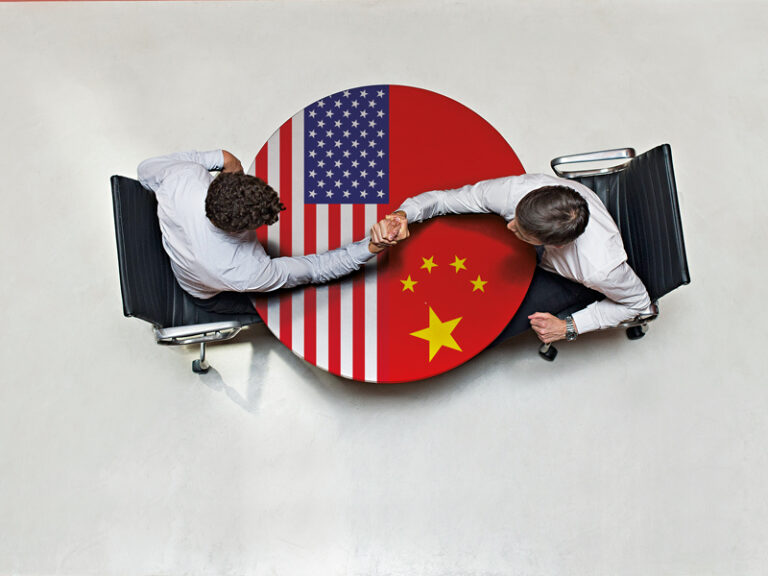As the US-China trade war intensifies, with both nations slapping tariffs on each other’s goods, Nigerian entrepreneurs may feel the ripple effects. In 2024, 27.8% of imports into Nigeria came from China, and US exports to Nigeria amounted to $4.2 billion. Economist and entrepreneurship researcher Tolu Olarewaju explains how the diversion of Chinese goods from the US to emerging markets like Nigeria could impact local businesses—and how entrepreneurs can prepare.
The Dangers of the Tariff Tensions for Nigerian Entrepreneurs
China, the world’s largest manufacturing hub, produces far more than its domestic market consumes. With an almost $1 trillion goods surplus, China exports more than it imports. Due to subsidies, state financial support, and cheap loans for favored firms, Chinese products are often manufactured at a fraction of their true cost.
If the US imposes tariffs that make Chinese products too expensive for its market, China will likely divert its exports to other developing nations, including Nigeria. This shift could disrupt local entrepreneurs by flooding the market with cheaper Chinese alternatives, making it difficult for them to compete.
Here are some Nigerian sectors that could be impacted by this shift:
-
Textiles and Garments:
Nigeria is West Africa’s largest producer of textiles, contributing 2.97% to the nation’s GDP in 2023. However, Chinese textiles, garments, and leather goods—produced at a much lower cost—could easily replace locally made products, particularly in the low-cost market. -
Furniture and Home Décor:
Nigerian artisans are skilled in creating wooden furniture and home décor, but China’s mass production of inexpensive, high-variety furniture may dominate the market. Nigeria’s $5.11 billion furniture market is growing, but it could be threatened by China’s affordability. -
Footwear:
The Nigerian footwear market, valued at $2.57 billion in 2025, faces competition from China, which produces 61.9% of shoes imported into the US. Nigerian manufacturers of footwear, which produces 50 million pairs annually, might struggle to compete with cheap Chinese imports. -
Beauty, Cosmetics, and Skincare:
With a growing demand for soap and skincare products in Nigeria, Chinese mass-produced beauty products could flood the market, challenging local manufacturers who are growing in popularity.
Key Challenges Facing Nigerian Entrepreneurs
Nigerian entrepreneurs already contend with a variety of challenges, many of which could be exacerbated by the trade war:
-
Weak Infrastructure:
Power outages and poor road conditions create logistical nightmares for businesses, making it difficult to operate efficiently and distribute products. -
High Inflation:
With inflation rates hovering at 24.48% in January 2025, entrepreneurs are facing rising costs for raw materials, fuel, utilities, and transportation. Inflation further reduces consumer purchasing power, making it harder to sell locally produced goods. -
Interest Rates and Loan Accessibility:
High interest rates and restrictive collateral requirements make business financing difficult, squeezing profit margins and raising operational costs. -
Political and Economic Instability:
Nigeria’s unpredictable political climate and inconsistent regulations make it hard for entrepreneurs to plan effectively, adding to the already high costs of doing business. -
Currency Depreciation:
The depreciation of the Nigerian naira has escalated import costs, leading to rising production costs. Volatility in exchange rates also makes it harder for businesses to forecast future expenses, especially for exporters.
How Nigerian Entrepreneurs Can Prepare
Despite these challenges, Nigerian entrepreneurs can adapt and thrive by employing the following strategies:
-
Identify Niche Market Needs:
Focus on areas that aren’t easily filled by Chinese imports. For example, locally produced high-quality goods or unique products with a cultural or artisanal appeal are harder for Chinese companies to replicate. -
Focus on Exceptional Customer Service:
Building customer loyalty through excellent service and reputation can help businesses stand out, even in a crowded market filled with cheaper alternatives. -
Embrace Innovation and Technology:
By incorporating new technologies, entrepreneurs can increase operational efficiency, lower production costs, and stay ahead of competitors who rely on outdated methods. -
Diversify Supply Chains:
Relying too heavily on imports from one country exposes businesses to risk. Entrepreneurs should seek alternative suppliers, explore local sourcing options, and build inventories of essential materials to avoid shortages and price hikes. -
Explore Regional Export Opportunities:
Nigerian entrepreneurs should tap into regional trade agreements, such as the African Continental Free Trade Area (AfCFTA), to access new markets and reduce dependency on foreign imports. -
Focus on Value Creation:
Entrepreneurs who focus on value-added products—such as processing raw materials locally rather than exporting them—are better protected against global shifts. For instance, processing cocoa into chocolate or cashews into gourmet products offers better profit margins and market resilience.
Final Thoughts
The US-China trade war presents a clear challenge to Nigerian entrepreneurs, especially those in manufacturing and production sectors threatened by cheaper Chinese imports. However, with strategic planning, focus on innovation, and a commitment to building customer relationships, Nigerian businesses can not only survive but thrive amidst global economic changes. By remaining adaptable and committed to value creation, entrepreneurs in Nigeria can continue to drive growth and stay competitive in an increasingly complex global marketplace.

